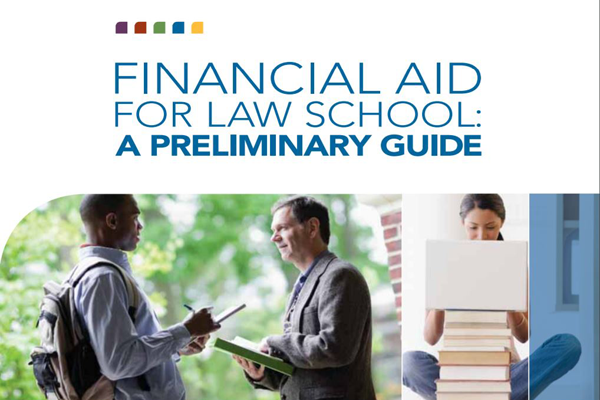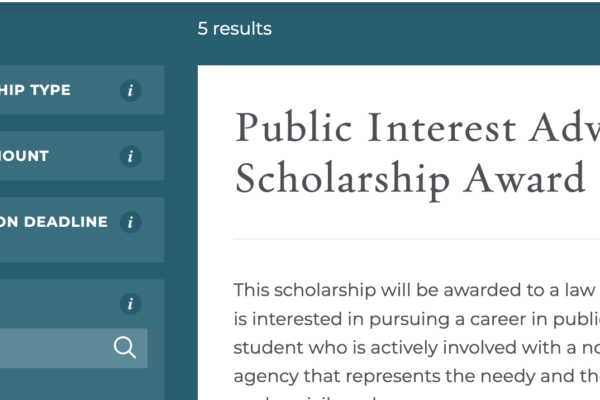Financing law school starts with planning for the costs of applying! Visit our Credential Assembly Service (CAS) & Transcripts page for more information on fees associated with the application process.
It is true that law school is a large investment. Organizations such as AccessLex have been created to help increase access and equity within the field of law. We highly recommend reviewing their website and being proactive about accessing information related to financing law school.
Note: Pre Law students should plan to fill out the FAFSA for law school, starting as early as October the year before. If you plan on applying to Wisconsin Law School, this is also a good time to fill out the general scholarship application on the Wisconsin Scholarship Hub (WiSH) to see campus based scholarship opportunities for which you may qualify as a law student.
Types of Financial Aid
Law schools offer two primary forms of financial aid: (1) aid based on academic grades, test scores, and sometimes various forms of achievement (often called “merit-based”) and (2) aid based on financial need (often called “need-based”). Applicants may be less familiar with the concept of “merit-based” aid, but it is important to become familiar with this type of aid. Law schools have significant pools of “merit-based” aid, and it is not uncommon for 50% or more of admitted applicants to receive this type of aid offer.
Law schools award merit-based financial aid based on various factors including, most commonly, an applicant’s GPA and LSAT score. Law schools will make the decisions whether to offer aid and what types of aid to offer based on your law school application. You do not have to submit any additional documentation initially in order to be eligible for most merit-based financial aid. Exceptions include a limited number of public interest scholarships and other named scholarships for which certain schools may require an additional essay, letter(s) of recommendation, and/or an interview.
Applicants often find out whether they are being awarded merit based financial aid and the amount at the same time they find out they have been accepted to the law school. However, some schools may let you know that they will be making those decisions at a later date.
Be cautious of conditions that some law schools may place on their offers of merit-based financial aid. Overly restrictive conditions could be difficult to satisfy, and you could be at risk of losing your aid award. For example, a scholarship that is conditional on receiving a certain GPA in law school could be risky due to the fact that law schools grade on a sharp curve. It is very likely that not everyone who is awarded a conditional scholarship will meet the GPA requirement, and some applicants will lose their scholarship by design. Be proactive in seeking to understand all conditions of your aid offers.
In addition to having a pool of merit-based financial aid to allocate, law schools may also have a pool of need-based aid. In order to be eligible for a need-based scholarship award, you will need to submit documentation establishing your need. The documentation law schools require to establish your level of need varies from school to school. Some schools only require you to complete the Free Application for Federal Student Aid (FAFSA). Still others have their own internal application process. It also varies from school to school as to whether you are required to submit information documenting your parents’ income. Consult the financial aid page of each law school that you are admitted to for school-specific information on need-based aid.
Legal Salaries
It’s also important to consider what type of salary you can reasonably expect to earn given what types of law you may want to practice when you decide how much you plan to spend on law school. Be wary of simply googling average law salaries; the number may look much higher than you can expect in certain types of law jobs because top tier law firms pay such high salaries.
Financial Planning Resources
Paying for Law School Guide
AccessLex's Paying for Law School Guide discusses Financial Aid, Grants and Scholarships, Federal Work Study, Loans, FAFSA filing, and budgeting for law school applications and Bar prep.
Available in English and Spanish.

Financial Aid for Law School: LSAC Guide
The LSAC Guide discusses financial aid eligibility, repayment options, and questions to ask law schools about financial aid.

Ask Edna- Free 1:1 Help with Financial Questions
Ask Edna is free to use and houses a full suite of Pre-Law tools, including financial information for law school and help selecting schools. You also can sign up for a free 1:1 meeting to ask an expert your law school financial questions!

Outside Scholarship Searches
In addition to need based and merit based aid, there are additional scholarships that you may apply to. These are great resources to find those scholarships.

Student Loan Calculator
Learn your true cost of attendance and know all of your options.

Tax Considerations for Law Students
Do law students need to file a tax return? What should I know about dependency status on my parents' taxes? What tax tools are available to help me?

Additional Resources
- Budgeting for applications & Cost cutting suggestions
- Financial Aid Webinars by Accesslex
- Fact Sheet: Public Service Loan Forgiveness
- Fact Sheet: Public Service Law Salaries and Caseloads
- Comparison: T14 Loan Repayment Assistance Programs (LRAPs)
- Financial Aid & Negotiating Scholarships
- Law School Financial Resources for Non U.S. Citizens

